Feature: Asia’s undemocratic trend
Rebecca Root, IBA Southeast Asia CorrespondentThursday 21 March 2024
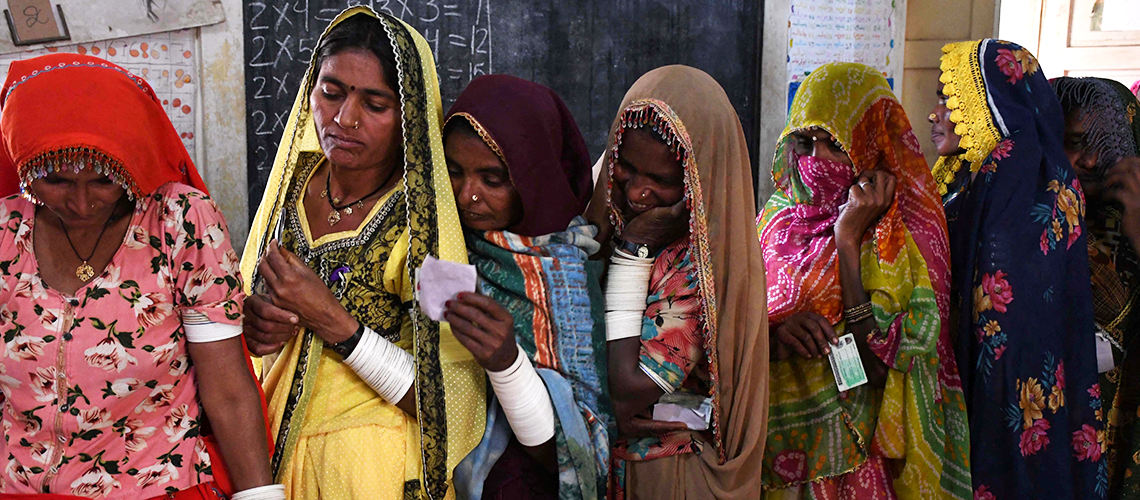
Hindu women wait in a queue to cast their votes at a polling station during general election, in Tando Allahyar, Sindh, Pakistan, 8 February 2024. REUTERS/Yasir Rajput
National elections being held in 2024 across Asia serve to highlight concerns for the rule of law in several countries, including India and Pakistan.
Over 60 national elections will take place around the world in 2024. Almost 20 of these have already happened or will take place in Asia, often using electoral systems that – according to human rights groups – don’t always ensure the will of the people is adequately reflected in the results.
Given its significant presence on the world stage, India’s election will perhaps be the most closely watched. The country will head to the polls in April and May in what’s expected to be a victory for incumbent Prime Minister Narendra Modi and his Bharatiya Janata Party (BJP). But there’s dispute over the implications for human rights and the rule of law in a country of over 1.4 billion people.
Division amid development
‘The good side is that Modi is able to cover extreme division. He ]brings] a lot of stability. He’s able to pass whatever legislation he’s able to bring in’, says Satyajit Gupta, Vice Chair of the IBA Asia Pacific Regional Forum. But Modi is accused, Gupta explains, of failing to look after the rule of law and of the interests of minorities.
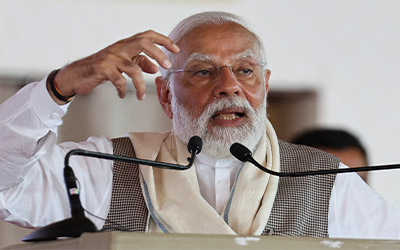
India's Prime Minister Narendra Modi addresses his supporters, India, 12 March 2024. REUTERS/Amit Dave
Modi, 73, has been in power since 2014. Many praise him, and ritualistically tune into his monthly radio show in which he lays out his plans for the one of the world’s fastest growing economies. Others, however, criticise what they see as his failure to advance the wellbeing of certain demographics in India, despite the country’s overall development.
In May 2023, the US State Department, through its 2022 International Religious Freedom Report, accused the Indian government of the poor treatment of religious minorities – including Muslims, Hindu Dalits and Christians – as well as attempts to silence critical journalists and political opponents and of the torture and inhumane treatment of prisoners. And when a video showing a brutal attack on two women in the state of Manipur circulated widely online in spring 2023, there were calls for the government to go much further in its reaction to the crime.
Some believe that Modi and his supporters will aim, should they win another term, to make India a Hindu nationalist state, says Tahera Mandviwala, Co-Chair of the IBA India Working Group and a partner at TDT Legal in Mumbai. She adds that a third term for Modi is being seen in some quarters as a threat to Indian democracy and secularism, with many members of minority religions worried about their status over the next decade. Mandviwala describes the average Indian voter as having ‘mixed sentiments’ about a potential Modi victory.
The Indian government did not reply to Global Insight’s request for comment. However, Modi has publicly defended the health of India’s democracy. While on a state visit to the US in summer 2023, he told reporters that there’s ‘absolutely no space for discrimination’ when asked about concerns that India is backsliding on certain democratic rights. He denied that his government has allowed violence against Muslims, for example, to go unchecked.
Ramesh Vaidyanathan, former Co-Chair of the IBA Asia Pacific Regional Forum and co-managing partner of BTG Advaya in Mumbai, believes India’s global profile will be enhanced if Modi wins a third term. He says that, in respect of the human rights situation, the concerns have less to do with Modi’s regime itself and indicate instead a need for police and legal reforms. Three years ago, for example, India’s then Chief Justice alleged that the country’s police stations are a threat to human rights. ‘I definitely see a lot of scope for improvement, generally speaking’, says Vaidyanathan.
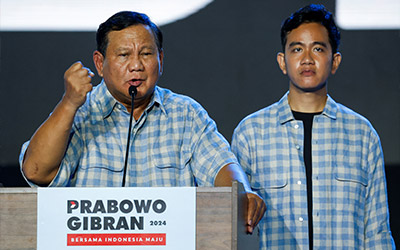
Indonesia’s leading Presidential candidate Prabowo Subianto delivers victory speech next to his running mate Gibran Rakabuming Raka, Jakarta, Indonesia, 14 February 2024. REUTERS/ Willy Kurniawan
While Modi has promised to take action to create better and simpler laws, and suggested that he’ll update the country’s legal framework to more efficiently tackle today’s problems, there’s ‘a general perception that the judiciary has become weaker’ under his government, says Mandviwala. ‘The government has been accused of exploiting system gaps and loopholes to undermine the judiciary, including [regarding the] appointment of judges, and to weaken laws and democratic governance institutions.’
Modi’s government has been accused of exploiting system gaps and loopholes to undermine the judiciary
Tahera Mandviwala
Co-Chair, IBA India Working Group
Despite the criticisms, political analysts believe Modi’s overall popularity will carry him through this next election. His approval rating sat at 75 per cent in February and in a survey of 24 countries, Pew Research ranked Modi as the third most popular leader of those analysed. Under his leadership so far, India has seen a decline in poverty and a boom in its infrastructure output, and the country is set to become the world’s third largest economy by 2030.
With little in the way of opposition, the government also isn’t being pushed hard on any contentious issues, Gupta says. Other parties, such as the Indian National Congress and the Indian National Developmental Inclusive Alliance – a coalition of over 20 opposition groups – lack the support needed to generate much of a threat. Modi’s party won state elections in Rajasthan, Madhya Pradesh and Chhattisgarh in 2023 – a preview, perhaps, of the upcoming national vote.
Citizenship controversies
A particular concern for Modi’s critics is his government’s attitude towards some religious minorities within India, especially Muslims. According to the Council on Foreign Relations, Muslims in India are discriminated against, are often the targets of violence and have had their rights further restricted by Modi's government. India’s Citizenship Amendment Act, which was passed in 2019 but only implemented in March 2024 due to the unrest it caused when put forward, sets out the path to citizenship for those who entered India before December 2014 from Afghanistan, Bangladesh and Pakistan. However, while the law grants an accelerated route to nationality for followers of many religions, Muslims aren’t given this right.
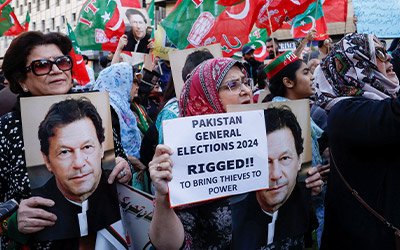
Supporters of former Prime Minister Imran Khan and the Pakistan Tehreek-e-Insaf (PTI) attend protest in Karachi, Pakistan, 2 March 2024. REUTERS/Akhtar Soomro
Meanwhile, the new Uniform Civil Code (UCC) has also been the source of controversy. The UCC has been implemented in one BJP-ruled state so far and is expected to be replicated elsewhere across India if Modi wins the election. The UCC replaces religion-specific civil laws with a blanket mandate to govern civilian personal matters, such as marriages, inheritance and divorces, equally. For example, the UCC would specify the age at which people can marry, contrary to the current situation whereby the age at which one can wed varies according to community.
Some commentators have criticised the UCC for overruling historic and cultural practices, while others say that the changes would bring benefits to some members of minority communities – especially women – by abolishing certain practices. In speeches defending the UCC, Modi has referred to the ‘equal rights’ set out by India’s Constitution and said the government is trying to avoid a ‘dual system’ of law.
Meanwhile, groups such as Human Rights Watch and Amnesty International continue to voice their concerns about India’s approach to the human rights of its minority groups. In February, for example, Human Rights Watch claimed the Indian government was ‘using abusive foreign funding laws, trumped-up financial investigations, and other means to unlawfully attack civil society groups’.
‘Those who call for justice, which is the broad range of civil society stakeholders, are having their resources cut off from under their feet. They are unable to operate more and more’, explains James Gomez, Regional Director at the Asia Centre, a social impact research organisation.
An anti-democratic trend
Such a crackdown on civil society groups, minorities and freedom of expression is a regional trend, one that 2024’s elections are highlighting. According to Gomez, Asian elections are often ‘not representative of the will of the people’.
For example, in Bangladesh, Prime Minister Sheikh Hasina secured a fifth term in January’s election. However, the main opposition, the Bangladesh Nationalist Party, was among the parties who boycotted the election when its calls for an independent caretaker government to preside over the polls were rejected.
In Indonesia meanwhile, Prabowo Subianto, the current Defence Minister and a former general, claimed victory in the island nation’s presidential election in February. However, Subianto is a controversial figure, who was once banned from entering the US on account of his human rights record.
Pakistan is currently in the aftermath of its own election. Mired in allegations of rigging, a split election in February meant weeks of wrangling, which finally resulted in a coalition government being formed between the Pakistan People’s Party and the Pakistan Muslim League-Nawaz (PMLN) party led by three-time prime minister Nawaz Sharif, with the latter thought to represent the preferences of the country’s powerful military. Sharif’s younger brother, Shehbaz Sharif, was eventually named as the new prime minister.
However, neither party won more seats in the election than the independent candidates who had, until weeks prior to the vote, been part of the Pakistan Tehreek-e-Insaf (PTI) party led by Imran Khan, also a former prime minister.
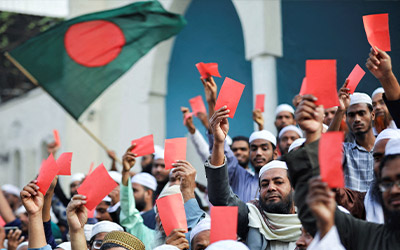
Supporters of Islami Andolan Bangladesh party attend a protest rally demanding to abolish "dummy election", in Dhaka, Bangladesh, 9 January 2024. REUTERS/Mohammad Ponir Hossain
A vocal critic of the military, Khan was removed from power in spring 2022 and in January 2024 was sentenced to jail after being found guilty of leaking state secrets in relation to a sensitive diplomatic cable. He has also been given a further sentence relating to allegations of corruption, while his political party has been dissolved. Khan denies all wrongdoing and has previously described the charges as being part of a military campaign designed to prevent him from participating in the election.
The PMLN was initially thwarted by the popularity of the former PTI members who were forced to run as independents and gained enough votes to require a governmental coalition to be formed, explains Asma Faiz, Associate Professor and Director of Political Science at Lahore University of Management Sciences. Joshua Kurlantzick, Senior Fellow for Southeast Asia at the Council on Foreign Relations, adds that Pakistan’s election – the country’s third – was not free or fair. Kurlantzick refers to the vote as a ‘farce’ given, for example, Imran Khan’s predicament.
We have regressed as far as rule of law is concerned […] because Pakistan’s military is all powerful once again
Asma Faiz
Associate Professor and Director of Political Science, Lahore University of Management Sciences
The ultimate result of the election is a minority government, where over 40 per cent of the people may feel unrepresented, says Gomez. ‘This will unsettle the rule of law’, he says, explaining that laws may be brought in to suppress the voices who didn’t get representation in the election. In recent years, laws have been passed in Pakistan granting the military the power to search any person or place suspected of breaching the law and to arrest those who even unintentionally engage with a foreign power it views as jeopardising the safety and interests of the country.
Rights groups have also highlighted concerns about torture and forced disappearances in the country. ‘We have regressed as far as rule of law is concerned, as far as the notion of civilian supremacy is concerned, because the military is all powerful once again’, says Faiz. ‘The military shadow looms large. This will continue.’
Learning from strife
Commentators are divided on the extent to which India’s elections will be truly democratic. While Vaidyanathan believes the country’s elections will be ‘clear, free and fair’ and that India maintains ‘a robust and thriving democracy’ Gomez is concerned that the election will be ‘divisive in nature’, with the use of national security laws to frame expression as acts of terrorism.
Gomez calls for more international non-governmental organisations to form and strengthen partnerships with local actors as they work to defend human rights and the rule of law. ‘They will need at least short- to mid-term support to find their feet as they get beaten back’, he says.
We need to be extremely watchful and learn from other countries [and] the issues they and the subcontinent have come through
Satyajit Gupta
Vice Chair, IBA Asia Pacific Regional Forum
For Gupta, the legal community must continue to use the judiciary to ensure minority groups are protected and human rights defended. ‘Ensuring that the judiciary and the legal protections play a significant, and an open and active, role, and ensuring that the rights of minorities, the human rights of all, are guaranteed [and] protected is extremely important’, he says.
Gupta highlights that numerous countries in the region have witnessed strife, civil war and martial law, and ‘these have resulted in the rights of religious minorities, the rights of smaller groups, being compromised, being neglected and harmed’, he says, adding that this has had a domino effect on the entire concept of law and on the institutions protecting human rights. ‘We need to be extremely watchful and learn from other countries and learn sometimes from the mistakes and the issues that [they] and the subcontinent have come through’, he says.
Rebecca Root is a freelance journalist based in Bangkok, covering humanitarian issues. She can be contacted at rebeccaroot1@gmail.com